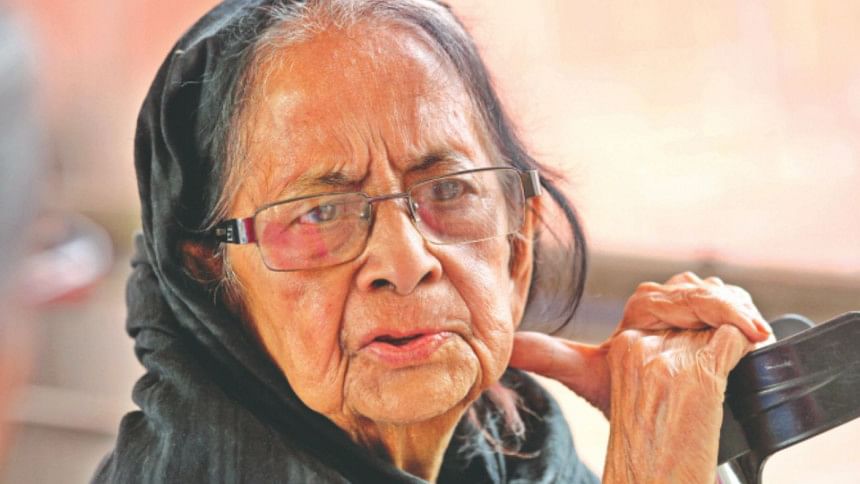Mortuary Mothers, Funeral Fathers

THE mother lies in the mortuary. Her son is trying desperately to get an airline ticket from the States to get home for her janaza. It could take three days. The body is getting colder in the ice box. She wanted an early burial; that was her wish, now disrespected.
For the last five years, he could not come 'home', which is not what her grandchild calls it . . . his house back in New Jersey needed repair, they installed a new patio too, the garden had to be refurbished with gremlins and all, then there was this very dear friend's daughter's wedding in Texas; he had been real busy over the past eighteen hundred days, not a day was Mother's Day.
Maybe after this time, this one visit, he would not need to go to Bangladesh for a long time, ever. His everything is now in the States.
Nonetheless there was Skype, then also Face Time, WhatsApp. The mother got to talk to her growing grandchild. People who did not know his son even two years back were spending 'her' time with the child, her blood. The mother like all mothers remained content despite the disjunction; at least she got that much of Skype time, or is it Face App?
He assumes his mother died a happy woman; her son (him, that is) tucked away in the comfort and security of the United States. His mother never told him how she could do with a ceiling fan that squeaked a little less; mothers don't complain to a son staying abroad. And how she dreaded the growing violence all around the world. Was her khoka safe? Her son perhaps knew that she was not.
The father of another NRB had been ailing for almost two years now. The son at seven, when he broke his arm, would not go to the doctor with just anyone. He wanted to be comforted by his dad. The son now had a career to build. The father was being looked after by a manservant, paid well by the pension he saved. The father wanted to be comforted by his son, but he never said it. Fathers say so little about such important matters.
Work kept him occupied in England. One important assignment even took him to Bangkok via New Delhi. But Dhaka was so far away. Now too far away, as he makes his way to London Heathrow to catch just that one flight to be at his father's funeral. Staring at the TV monitor in his First Class seat, he knows he could have made such a flight to Bangladesh every week. How many weeks must his dad have waited to touch that broken arm, now mended!
A man lived abroad for almost forty years with his mother in Jamalpur alive and well; at least that's what he thought. Ever since he left Bangladesh in the 60's, the son sent not a letter, he did not know what to write. He could not remember if his mother could read. But, she knew some bedtime rhymes. And a phone call till even the 1990s was difficult, and expensive.
He worked for a very big company, so his mother heard. She was a proud woman and did not break down in public even once. Why should she? After all, she bore the gentleman, and no force on earth can break that umbilical tie. Only he could.
His mother died quietly, surrounded by all her other children, but her eyes hovered one last time to see if Bablu had finally made it home. Indeed he was home in some villa in the French Riviera, surrounded by his family on a fine summer afternoon enjoying his pastries and croissants. Thank God! She was spared the distress of the mortuary. They knew he would not come.
Another couple had everything in Bangladesh: good education, great job, respect, enough income to live a well-heeled life. But they wanted more, whatever that meant, and only the US of A could promise them that, so they calculated. Two plus two did not make four. After three decades they continue to languish, living in worse conditions than they would ever be in Bangladesh. Their parents, all four, waited with hope, schemed to spoil their grandchildren, prayed for their dream return. There were four separate funerals spread over a decade, but the fortune-seekers could never make a trip back home. And home is not always where you live.
What is this enticement that robs the final days of happiness of ageing parents? Why do some people think their life begins with them, and continues with their children? Is it not false security when their parents and siblings are living in the 'unsafe' country they abandoned?
The charm of life is in giving back to our country, our people. There is gratification in fulfilling a debt owed to times gone by, to people that were once as close as our heartbeat. Lest we forget, it takes only a generation to be an ageing parent.
The author is a practising Architect at BashaBari Ltd., a Commonwealth Scholar and a Fellow, a Baden-Powell Fellow Scout Leader, and a Multiple Paul Harris Fellow-cum-Benefactor Rotarian.

 For all latest news, follow The Daily Star's Google News channel.
For all latest news, follow The Daily Star's Google News channel. 



Comments